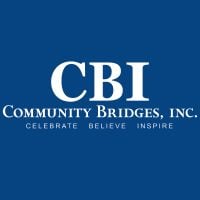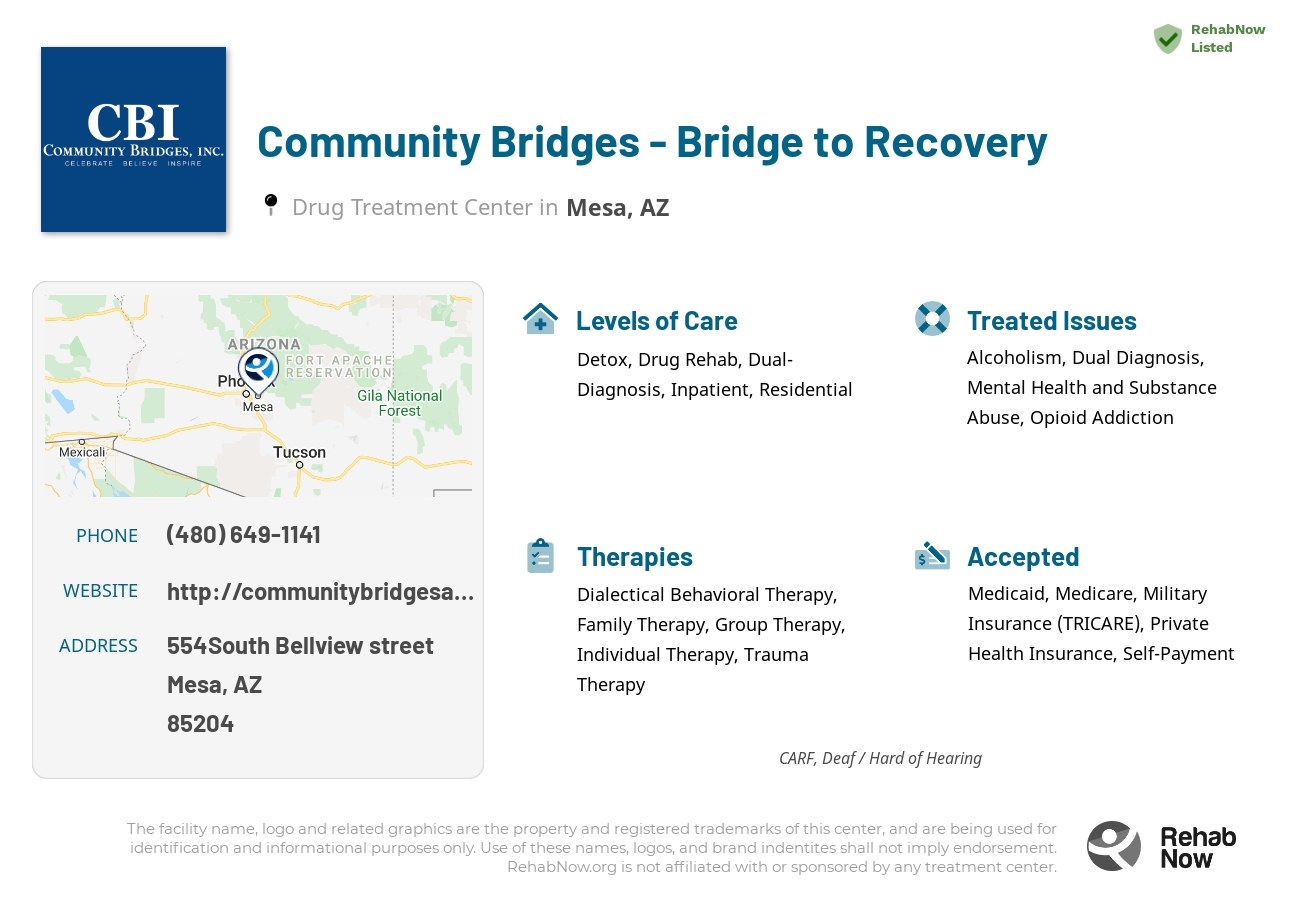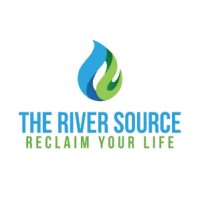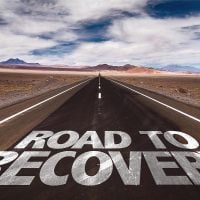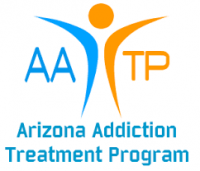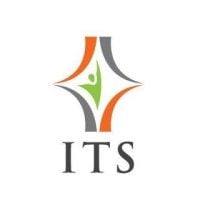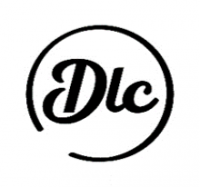Community Bridges - Bridge to Recovery
Drug Rehab Center in Mesa, Arizona
Community Bridges – Bridge to Recovery in Mesa, AZ offers compassionate, evidence-based care for those suffering from alcoholism, opioid addiction, and dual diagnosis, with treatment methods including therapy, detox, and inpatient care, and additional resources through its affiliation with the Community Bridges network of treatment centers.
About Community Bridges - Bridge to Recovery in Arizona
Community Bridges - Bridge to Recovery is an Addiction Treatment Facility located in Mesa, Arizona. Established in 1982, this facility specializes in helping individuals suffering from alcoholism, dual diagnosis, opioid addiction, and drug addiction. As a testament to their commitment to providing quality care, they are accredited by CARF, an independent nonprofit organization that evaluates and certifies health and human service providers. Community Bridges - Bridge to Recovery offers a range of treatment options, including detoxification, drug rehabilitation, dual-diagnosis programs, inpatient services, and residential levels of care. They accept private health insurance and are affiliated with Community Bridges, a broader network of addiction treatment centers.
Community Bridges - Bridge to Recovery in Mesa, Arizona, offers a comprehensive array of services for individuals struggling with addiction and substance abuse. Apart from providing detoxification services to help individuals safely withdraw from drugs or alcohol, they also offer drug rehabilitation programs for those seeking long-term recovery. Additionally, their dual-diagnosis programs cater to individuals with co-occurring mental health disorders, ensuring that both issues are addressed simultaneously. With inpatient services and residential levels of care, they provide a structured and supportive environment for individuals to focus on their recovery journey. Accredited by CARF and affiliated with Community Bridges, this facility is dedicated to offering effective and quality addiction treatment to those in need.
Genders
Ages
Modality
Additional
Accreditations

CARF
The Commission on Accreditation of Rehabilitation Facilities (CARF) is a non-profit organization that specifically accredits rehab organizations. Founded in 1966, CARF's, mission is to help service providers like rehab facilities maintain high standards of care.
Conditions and Issues Treated
With so many people addicted to opioids, we need to help those who want to quit. The cycle begins when opioid addicts take opioids for a painful injury. When someone starts taking their medication differently or in excess, it means they’re addicted and at risk of overdosing.
In , detoxing from these types of treatments is the most effective way to beat this. Most facilities begin with medical assistance and then provide counseling services; rehabilitation follows after successful treatment.
Dual diagnosis refers to someone who has both an addiction and a mental or emotional illness. Dual diagnosis treatment includes therapy for both issues simultaneously, allowing for effective treatment of either.
Sometimes people with addiction disorders also have co-occurring disorders like depression, anxiety, bipolar disorder, etc. These require specialized treatment programs that address both drug and alcohol addiction as well as psychiatric illnesses. Some rehabilitation facilities provide patients with co-occurring disorders a program with highly integrated services and a clean, distraction-free environment.
Levels of Care Offered
This center offers a variety of custom treatment tailored to individual recovery. Currently available are Detox, Drug Rehab, Dual-Diagnosis, Inpatient, Residential, with additional therapies available as listed below.
Detox is an integral part of recovery and often very hard. Detoxification is the process of letting the body remove the drugs in it. It addresses the physical aspect of addiction. Detox from drugs can be unsafe as the patient undergoes withdrawal symptoms that range from headaches, vomiting, body aches to seizures and cardiac arrests. The main purpose of detox is to keep the drug users comfortable as the drugs leave their system.
Quitting cold turkey is not recommended and can lead to many issues. Detox is best done under medical supervision so that a team of experts can monitor the side effects and complications. Detox, alone, does not guarantee sobriety as the underlying psychological issues are not addressed.
Inpatient treatment is a form of recovery used in drug rehab. Inpatient recovery offers individual therapy, groups, and family therapy to ensure that the addict has the best recovery possible. A variety of treatments are provided in this type of recovery, depending on what treatment the addict needs at that particular time.
The length of inpatient addiction treatment depends on the addict and their addiction. Inpatient rehabilitation can last anywhere from 30 days to 90 days, depending on how severe the drug abuse is. Inpatient rehab is a costly drug treatment, costing anywhere from $30k- to $60k. However, insurance often offers help in covering these costs.
Residential treatment programs are those that offer housing and meals in addition to substance abuse treatment. Rehab facilities that offer residential treatment allow patients to focus solely on recovery, in an environment totally separate from their lives. Some rehab centers specialize in short-term residential treatment (a few days to a week or two), while others solely provide treatment on a long-term basis (several weeks to months). Some offer both, and tailor treatment to the patient’s individual requirements.
Therapies & Programs
Different people react differently to various treatment options. Some drug rehabilitation centers offer individualized treatment that caters to the specific needs of a drug addict. The best treatment option varies on an individual depending on the type of drug abused, life history, medical condition of the person, social circumstances, and the environment they live in now.
When a person enters drug rehab, they usually have anti-drug associations such as withdrawal symptoms, stress, cravings, etc. The first step of drug rehab is to detoxify the body from any residual substances in it. Drug rehabilitation centers usually employ trained medical professionals to help in this process. Usually, the initial detoxification lasts for five days, where the person is monitored under close supervision.
Family therapy sessions typically involve the addict and their family members. During these sessions, a therapist will work with everyone involved to help them understand addiction and find healthy ways of coping without substance abuse.
Some addicts might feel embarrassed about their substance abuse problems. By encouraging family members to attend these sessions, therapists can show addicts that they’re not alone in dealing with addiction. Therapists can also work with family members to help them understand addiction and learn how to offer support and encouragement to their loved one as they deal with substance abuse issues.
Attending group therapy at Community Bridges - Bridge to Recovery in , is a useful way for those seeking sobriety to realize they aren’t the only one going through it.
This is when a group of people on different recovery phases get together and talk about what they’re going through, their triggers, successes, and failures. This can include alternative types of therapies too! Group therapy may occur on an outpatient or inpatient basis with groups that have no pre-existing relationships outside the session, unlike support groups where everyone already knows each other beforehand.
Trauma therapy is a form of therapy used to help people process and understand past traumas. This can help struggling addicts, as many people turn to drugs or alcohol to mask the pain of their past. Trauma therapy can be done in several ways, such as through visualization, discussion, and writing down thoughts and feelings. The goal is to help the individual understand why they are having problems coping with certain situations and changing how they think and react to things. This is often done in tandem with other therapies to treat the underlying issues associated with addiction.
The idea behind trauma therapy is that while some people can experience traumatic events and not have lasting psychiatric symptoms, many others will. In these cases, memories get hidden from consciousness but continue to influence how the person processes and copes with things in their life. They may avoid situations that resemble what happened or become suddenly angry or irritated to a situation that reminds them of a past event. With the help of a therapist, people can go back over memories and experiences. This helps them understand why they are having problems coping with certain situations and changing how they think and react to things.
This type of cognitive-behavioral therapy helps people understand how their thoughts, behaviors, and feelings are interconnected. It can help patients with borderline personality disorder gain control over their actions and stop self-harming thoughts and attempts.
Cognitive Behavioral Therapy is a type of psychotherapy that helps people address the thoughts and behaviors that may have led to their addiction. It also helps change negative thoughts into positive ones and promotes healthy communication between addicts and those around them. CBT is an efficient treatment for individuals suffering from all sorts of addictions.
Cognitive Behavioral Therapy (CBT) focuses on the underlying thoughts and behaviors that caused the problem of addiction in the first place and may cause a relapse. Negative feelings are common in drug abuse disorders, but they can lead to co-occurring disorders if not recognized. CBT involves strategies that help to change the behavior pattern by restructuring negative thoughts into positive ones. It helps to remove these feelings, and it provides long-term benefits. Also, CBT promotes self-awareness, self-control and can be administered as a mono-therapy or as part of combination therapy.
Payment Options Accepted
For specific insurance or payment methods please contact us.
Is your insurance accepted?
Ask an expert, call (888) 674-0062
Community Bridges Associated Centers
Discover treatment facilities under the same provider.
- Community Bridges, Inc. (CBI) - Center For Hope in Mesa, AZ
- Community Bridges - Phoenix in Phoenix, AZ
- Community Bridges - Avondale in Avondale, AZ
- Community Bridges - Addiction Recovery in Phoenix, AZ
- Community Bridges Yuma Outpatient Services Center in Yuma, AZ
Learn More About Community Bridges Centers
Additional Details
Specifics, location, and helpful extra information.
Mesa, Arizona 85204 Phone Number(480) 649-1141 Meta DetailsUpdated November 25, 2023
Staff Verified
Community Bridges - Bridge to Recovery Patient Reviews
There are no reviews yet. Be the first one to write one.
Mesa, Arizona Addiction Information
Arizona has some of the highest rates of prescription drug abuse in the United States. Methamphetamines, heroin and morphine are among the most commonly abused substances. Prescription pain relievers were prescribed to 348 million people in 2012, enough to medicate every adult in Arizona for 2 full weeks. The number of people with substance use disorders in Arizona has remained relatively constant over the past few years.
Mesa, Arizona, has a higher rate of drug abuse and addiction than the national average. 1 in 10 residents struggles with drug abuse or addiction. The majority of those who struggle with substance abuse in the city is between the ages of 18 and 25. If you or someone you love is struggling with drug addiction and abuse, it's important to get help as soon as possible.
Treatment in Nearby Cities
- Benson, AZ (133.1 mi.)
- Prescott, AZ (87.0 mi.)
- Queen Creek, AZ (14.4 mi.)
- Ajo, AZ (93.7 mi.)
- Prescott Valley, AZ (88.2 mi.)
Centers near Community Bridges - Bridge to Recovery
The facility name, logo and brand are the property and registered trademarks of Community Bridges - Bridge to Recovery, and are being used for identification and informational purposes only. Use of these names, logos and brands shall not imply endorsement. RehabNow.org is not affiliated with or sponsored by Community Bridges - Bridge to Recovery.
